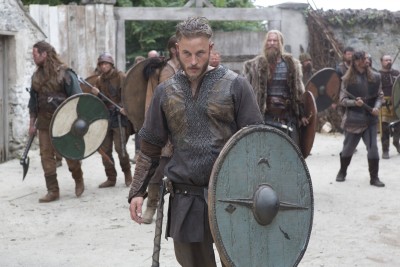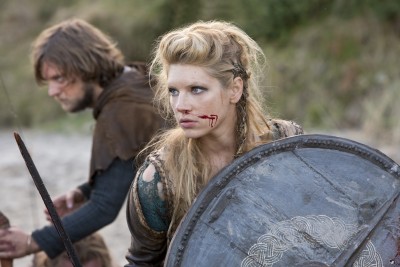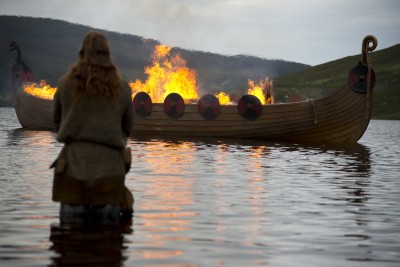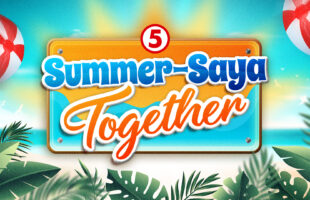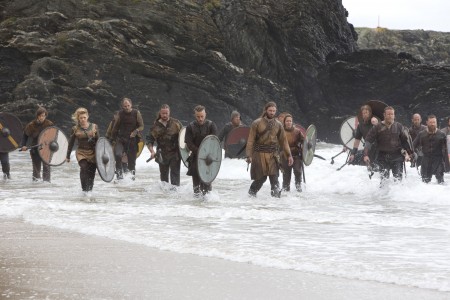
This interview is contributed by A+E Networks Asia.

Raiders from Vikings
Q: So how did the idea for the new drama series Vikings come about and why the Vikings in particular?
A: I have been interested in the Vikings for a long time. I mean every boy is interested in the Vikings anyway. And after I wrote Elizabeth, I wrote a movie about an English king called Alfred the Great, and he fought against the Vikings. I became really, really interested in their culture and their gods. Nothing happened with that movie, so I just kept my interest in my back pocket and waited until someone could come along to ask me if I was interested in Vikings. And then about two years ago, MGM said precisely that they were thinking about it. They just started their TV network up again and they were thinking about starting with the Vikings, and asked me whether I was interested in doing the show. And of course I was hugely and passionately interested. And I think this is the right time to be working on the Vikings because I don’t know if you’ve noticed – but all around the world, there is a huge interest in the Vikings at the moment. There are museums and shows from Australia to London about the Vikings. Everybody is curious about their culture.
Q: How would you describe Viking culture beyond just raiders and villagers, how differently is the show introducing this other side of them?
A: Whenever you mention the word Viking to anyone there’s a certain kind of visceral response – everyone thinks of them as the fake and terrible, terrifying raiders from the North who kill and plunder without conscience. Now, that picture of them was painted by hostile witnesses; in other words, what we know about Vikings or what we think we know about the Vikings came from the Christian monks who wrote about them and who had every reason to attack their paganism and exaggerate their faults, their violence and brutality.
The Vikings were of course a non-literate culture, they didn’t write anything down themselves. So I was digging around for research, and I also have a historical advisor who is an expert on the dark ages. When I was trying to find out more about what the Vikings were actually like, it was astonishing to find out that they were a much more democratic society than the sections or the frames of the society around at the time in western culture. Their attitude towards women, for example, was positively enlightened compared to other contemporary cultures; women could divorce their husbands, they could own property, women fought beside their husbands, brothers and sons in the shield war, and they could rule. I also discovered, for example, that the Vikings were very clean people; they bathed every week, they have saunas, they took a change of clothing when they weren’t raiding. Every Viking grave contains a comb. So there are many, many prejudices that I want to overturn and challenge in the show. I wanted to show that far from being Iron Age savages, the Vikings had a deep, complex and interesting culture. And on top of that, I have to say that I am particularly fascinated by their gods and their religious beliefs and their attitude towards nature. So, all of that I hope is a huge part of the show because I am trying to tell the story for the first time from a Viking point of view and I don’t think that has ever been done before.
Q: You’ve done great work in the past with Elizabeth, The Tudors, The Borgias and now you have the Vikings, what is it about going back in time that appeals to you more than picking up new and contemporary stories?
A: It’s probably something to do with the fact that I had a very academic background – I was in universities for about 10 years or so, and so there was the research part of my occupation. And I began every project by doing a lot of research, reading and thinking about the material. I really enjoyed that; I get a huge kick out of that. I love to see the stories, the characters emerging from the material; they become very real to me. Part of my job I think, is to humanise these people from the past and to make them relevant and interesting to people living today. I always say that the only two things I could do at school apart from sport, were history and English; and I’ve cleverly combined them to make a career.
There are probably other reasons: I suspect in a way that I can’t make sense of contemporary life. I never feel particularly drawn to writing about contemporary issues. I remember the philosopher William James said that a baby’s experience of the world is a buzzing and booming chaos. That kind of applies to my sense of what the contemporary world is – a buzzing and booming chaos. But when I look back at history, I see order or I can make sense of it in a deeper way. So there are many things, many reasons, why I do that but I’m sure it’s partly psychological.
Q: You mentioned a lot about the research you did for this series, how then did you insert the drama element into the series? Were you inspired by any particular Viking stories which were then turned into the script?
A: When I’m doing the research, part of it is that I’m looking for dramatic stories; I’m looking for moments in history that were groundbreaking or characters that were particularly significant and whose life were rich and complex and dramatic. My historical advisor and I came across this character Ragnar Lothbrok, who is the first great Viking leader who comes to us out of the mists of Norse legends and it was obvious from what little I could find out about him, that he was an extraordinary character who believed he was descended from the God Odin, who was one of first Vikings to travel the open ocean and raid the west. He raided England, Ireland and ultimately, raided Paris. He had two wives, a lot of sons who became very famous in their own time. So, I found this wonderful lead character and I knew I could dramatise his life and I wouldn’t have to invent stories particularly about him. I just developed what we know from history and at the same time, this was moment in time in Viking history when the Vikings broke out of Scandinavia and came west because they invented a new kind ship that could travel across oceans but also up rivers. And, also they discovered a way of navigating across open sea. So it was a wonderfully dramatic moment in European history.
Ragnar Lothbrok
Q: What made Travis Fimmel perfect for Ragnar?
A: That’s an interesting question. We had a very difficult and hard time casting the two lead roles – Ragnar and his wife Lagertha. As far as Ragnar was concerned; we kept seeing a lot of pretty, young sort of British actors. And I kept saying, “These guys couldn’t even lift an axe, let alone use one.” This has to be a real man and he has to have certain qualities, and he is not a conventional hero. Ragnar is not a conventional hero. He is an intelligent and thoughtful man, and I wanted him to have that sort of stillness; that depth which I feel is true to the Scandinavian character. We tried and we tried and didn’t get anywhere and then one day just when we were all getting desperate and we had to go into production but then very shortly, Travis took a tape of himself in his kitchen; in his farmhouse in Australia in which he taped himself doing the scene and didn’t pretend that he was a Viking; he didn’t over-act. He was very still; he read the scene absolutely intelligently and I watched this without first- director (Yohann Rank?), who is a Swede. And, we both thought we probably found our man, we probably found Ragnar Lodbrok. Travis is just an extraordinary character and he is not by any means a conventional hero. I’m really proud of the choice he made and there was some luck in that as well. But then that is what happens when you’re casting, and I think we got altogether a truly wonderful cast of people.
Ragnar’s wife Lagertha
Q: What lessons can the people of today learn from Vikings of the past?
A: It is not that easy to answer this, except that if you understand the past you understand more about the present. Where I am sitting in now at an apartment in Dalkey just outside Dublin by the sea, I can look across an island a few hundred yards away from where I am sitting. And, on that island is a ruined church and the church was ruined by the Vikings. And, I know on that island the Vikings kept the women that they had captured in Ireland and who they were going to send as slaves. And, wives too, most of them went to Iceland from here. In England, I grew up near York, which was a Viking town and Dublin is a Viking town: the Viking’s land in North America hundreds of years before Columbus. So their fingerprints are in many, many places around the world. I mean, they sailed the Mediterranean, they went to Spain. So to understand the Viking culture is to really understand about a lot of cultures, certainly here in the west. But there are other things to the Vikings, like their relationship to nature – it’s fascinating. They had a close relationship to nature; their gods lived with them in nature where they are the living forces in their lives. I think there is renewed truth in paganism, nature, the green movement around the world and somehow the Vikings knew it.
Q: Since Vikings is your piece – you conceptualised it, you wrote the episodes – which element of it are you most proud of? Is it the costumes, the story, the settings? And what do you think of the show’s appeal to your audience?
A: It’s important to say that these shows are very much made collectively – I create it, I write it and everything but it’s also the extraordinary cast and wonderful crew here in Ireland, fabulous directors, and it’s collaborative; couldn’t be done without our set-designers, the costumes, the human areas. I’m very proud of the team. I am proud that it has something to do with real things and real people and it is authentic in that sense. I did do an interview with the head of Scandinavian studies at Harvard University; who is a Swedish professor, and he said to me that this is the first time his subject has ever been taken seriously and intelligently. So I was very-very proud that I had addressed the Vikings properly and in that way, I think the appeal of the show is two-fold perhaps. In the first place, this is all very exciting, the battles and so on are choreographed such that the audience actually gets to feel what it’s like to fight behind a shield or a wall of shields. So it’s great that the story can reach a visceral level, at the same time, it is essentially a family saga which is about a man, his wife, his children, his god and his job; things that everyone can identify with. I get people connected to these characters; interested in them and make them feel that they are human beings that you can relate to and you’re fascinated. All that is possible and that is what I am pleased with.
O: How much freedom is HISTORY giving you in terms of material and how is this experience different from writing, for example, writing The Tudors?
A: Well, HISTORY have been wonderful because they basically stood back and said we trust you – you did shoot it and you know how to do it and we know this is going to be grounded in historical research and information because you told us that and we believe that. We’ve talked to academics and we have to, so we trust you and we understand that it is a drama as well but this is not a documentary. But this is HISTORY’s first long-form drama series. They took a leap in the dark and it could have all backfired for them, but in fact it’s gone remarkably well; Vikings is the No.1 new show on American TV; it garnered regularly between 6-8 million people in the United States which is quite extraordinary. Game of Thrones played to 1.4 million, so you can see that we’ve hit the ground running. But it’s a network channel instead of a cable channel so there are many things as a creator you can’t do on network but you can do on cable; you can’t have too much explicit, sexual content; you have to be careful about how you share the violence and so on. But I didn’t think of that as a problem, I thought of that as a challenge. I also think now, that too many shows (cable shows) are sharing too much gratuitous sex and violence that is virtually pornographic. So I think that Vikings didn’t need that approach, so we’re lucky that HISTORY has backed us 100 percent. They are putting more resources into the second season which we’re already shooting now; they’re already happy and we are really happy with our relationship with them.
Q: What’s more important to you when relaying the story of the Vikings, historical accuracy or engaging audiences?
A: Well, I’m not after accuracy because it is not a documentary, it is a drama. It’s based on research but is not an educational programme. It has to be a drama. But if it leaves people to be interested in Vikings and go read about them on their own and research, then that’s fantastic. That’s certainly happened, I know. With Tudors, I’ve got a lot of messages from teachers and students. There was a huge renewed interest in the period. Also, you know, this is the dark ages and it’s called the dark ages because we don’t know a great deal about what happened after the fall of the Roman Empire, and also in Europe. So of course, a lot of what I write is sort of speculation. It begins life as a historical fact but then I push it and develop it and then I explore it, and of course I have to make my characters interesting and entertaining. So I hope that in some way, I could have combined two things; I want the show to be very entertaining. Otherwise, I’m not doing my job. But, I want people to understand that it is also about real things and real people. I’m not interested personally in fantasy which is why I go again and again to real history.
Q: Were there any challenges when shooting Vikings? What was the most challenging thing to shoot?
A: Well, it is always challenging to shoot on water. And these Vikings’ boats; those were a huge part of their culture and they are known for their raids and explorations of the world. So we had to shoot on water; we had an authentic Viking boat built and actually when we filmed it; we had three boats in the series and this season we’ve got even more, eight or nine boats. We put them in the water and filmed them going up the river, and in early morning mist and it was an extraordinary moment where everyone stopped work to watch these Viking boats appearing out of the mist and rowing in the river.
This is how most people in Europe would first have seen the Vikings – this is how they appeared. So it was difficult to achieve that, but it was so wonderful when we did. And I suppose the other challenge was to make the battles and the fights interesting and absorbing. It would be easy to make them all seem the same, but in fact tactics were different; the experience was different. I wanted people, the audience, to understand the Vikings’ mindset about what battles meant to Vikings and what they would do. The challenge was to get inside a Viking’s head and to tell the story from their perspective.
Vikings
Q: What kind of training did the lead actors have to undergo to get immersed in Viking culture and to understand their characters?
A: Well, the guys had to do a lot of physical training. They had to learn to row; if they didn’t know how to ride; they had to learn to ride. They had to work out; they had to be very, very fit. They had to do a lot of training with weapons because there is quite a lot of fighting to do. Some of them already had an interest in the Vikings and some of them were Vikings. We cast a lot of Scandinavian actors because it is nice to have the real thing. And what they personally wanted to do to immerse themselves in Viking culture was really up to them. I put a lot of my research materials and books in them, and we’re available in my office to come and grab what they wanted or needed. I know some of them went to various sites of mansions in the show. So you know, there was real immersion for some of them; it depended on how much they wanted to immerse themselves.
Q: Can you give a quick elevated pitch on why audiences should watch the show?
A: They should watch it because it is one of the best things on television; I think so anyway. It’s been made by a group of wonderful, talented people and with a huge amount of passion; we all believe in the show so much. We feel that we’ve hit the ground running and it’s got better and better and richer and more powerful as we’ve gone along. As I say, one of my calling cards is that this is about real things, real people; things that actually happened. We can learn a lot about ourselves by looking back into a pagan past. I recommend it to audiences as a great watch, but hopefully it’s a thought-stimulating experience as well.


